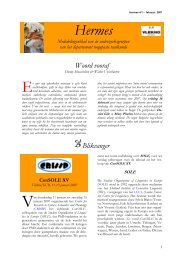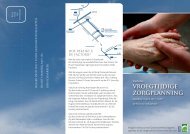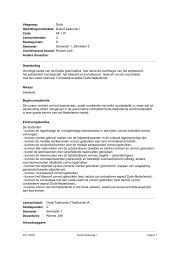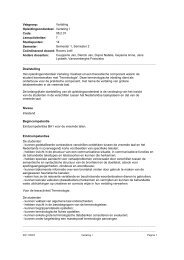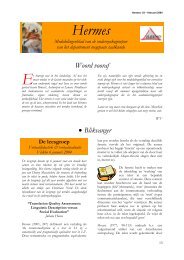HUB RESEARCH PAPER - Hogeschool-Universiteit Brussel
HUB RESEARCH PAPER - Hogeschool-Universiteit Brussel
HUB RESEARCH PAPER - Hogeschool-Universiteit Brussel
Create successful ePaper yourself
Turn your PDF publications into a flip-book with our unique Google optimized e-Paper software.
Process consultation revisited 15<br />
local agricultural school and an indigenous non-governmental organization. The engineers, in<br />
close collaboration with local facilitators, are working with demonstration fields and even<br />
simulations of plowing in experimental sandboxes. Farmers, assisted by young students of the<br />
local agriculture school, discuss with the technicians their experiences and problems with<br />
plowing on those difficult slope lands. They talk about the occurrence of erosion and fertility<br />
problems and discover new ways of fertilization and soil conservation. A remarkable event<br />
happens, when the farmers start to speak their local language, Quichua. The European<br />
coordinator in this project showed a deep interest to learn this language instead of Spanish. By<br />
learning Quichua, he made ‘real’ contact that opened a broader conversational space. The<br />
farmers have far more words in Quichua to distinguish different types and qualities of soil,<br />
depending on the land use and the cultivation of the land. They have in their local language<br />
different words for soil appropriate for wood or grass or farming land, taking into account the<br />
slope and the characteristics of the soil. This ancestral knowledge seems never to have been<br />
translated into Spanish, but it still belongs to the ancient community of practice (e.g., Wenger,<br />
1998) when they start to interact about their practices in the fields.<br />
This experience contrasts with another irrigation project where water engineers had been<br />
developing irrigation pipes for slope landing isolation of all stakeholders involved. Here the<br />
farmers could only be convinced to use the pipes when they got special financial support for it.<br />
The technology was not developed jointly but straight from the irrigation laboratory. A ‘multi-<br />
voiced’ joint learning space in which all stakeholders/voices could engage in social learning for<br />
interdependence (e.g., Bouwen & Taillieu, 2004) and become co-owner of the problem/project<br />
isn’t created. Hence, after the experimental period the farmers turned back to their non-<br />
sustainable existing practices of spraying the land.



